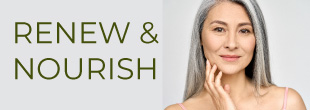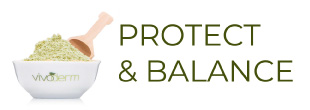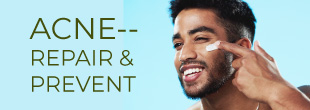Life Style
Our lifestyle affects the health and appearance of our skin
Yes, by regularly cleansing your skin, applying the correct products and developing improved skin habits can help keep your complexion blemish-free and clear, but if you are interested in longer lasting results, you need to target your skin not only from the outside, but from the inside as well. By choosing healthier options in food, consistently exercising, and making time for daily stress relief, are tools that not only will help your skin, but also will improve your health and the overall quality of your life. Understanding how our lifestyle choices affect the health and appearance of our skin is paramount.
Nutrition
At Vivoderm, we believe in a holistic approach to skin care. We invite you to experience the joys and benefits of living a healthy lifestyle, as it is an important ingredient for healthy skin. Depending on your particular state of health, your nutritional needs may vary. However, certain basic and simple concepts have been proven by the scientific community to have great benefits on the health of your body as well as your skin. It just makes sense that what is good for your body is also good for your skin. Following these general guide lines are recommended for healthy skin, in addition, they have been proven to reduce risk of heart disease, cancer, stroke, osteoporosis, high blood pressure and diabetes.
What to eat and drink: Eat plenty of various fruits and vegetables. A healthy amounts of: whole grains like high fiber cereal, whole-wheat bread and brown rice. Moderate amounts of: nuts, seeds and beans, Omega 3 from fish and botanical sources. Drinking plenty of water will help your cells and tissues stay hydrated and healthy.
What to avoid or limit: Saturated fats from animal sources, butter, cheese, trans fats such as fat found in processed foods and fried items, simple sweets like candy, excessive salt and alcoholic beverages.
Lifestyle
Regular Exercise: Health experts say regular exercise can play a big role in how young and healthy your skin looks and feels. Exercise has amazing benefits for the entire body, and skin, being the largest organ in the body, reaps all of these benefits. It can reduce acne breakouts as well as fight the signs of aging. Regular exercise increases circulation and delivers nutrients to skin cells, and eliminates potentially damaging toxins. As we age, our collagen-producing cells (fibroblasts) decrease in number and in function, leads to less firm, dry and wrinkled skin. With exercise, cells become infused with oxygen and other nutrients that create ideal conditions for collagen production. Furthermore, with regular exercise, your entire body, including the muscles in your face, tends to relax, causing the anger expression lines and crow’s feet to soften. Keep in mind, hydrating your body before and after exercise will encourage blood flow and toxin elimination. Also, make sure to wash your skin after sweating to remove the excreted toxins.
Stress Reduction: Unfortunately, stress has become a regular part of our everyday lives. Whether it is at work, at home, or in traffic, stress can slowly dominate our lives if we remain unaware. . Eventually, this can damage our body, mind and emotions. Our skin is also profoundly affected by stress. The accumulation of stress impacts our immune system and eventually leads to increased free radicals, which have a huge hand in premature aging. A person under stress is also more prone to break outs. Emotional trauma can also cause you to frown and pout, which eventually become permanent lines and wrinkles. Today, there are many resources available to help us relax and keep stress at bay. Relaxation techniques such as meditation, yoga, listening to soothing music and spending time with friends can help us keep things in perspective and reduce stress. Thousands of empowering and inspirational books are also available as an additional resource. Actively reducing stress and practicing relaxation, will improve the quality of our lives, as well as our skin.
Sleep: Sleep is a time when the body rests, replenishes, and regenerates. Thirty-three percent of our sleep occurs in the second stage , when hormone levels peak and cellular repair takes place. Damage could contribute to premature aging is repaired during this time. All stages of sleep are beneficial for dissolving free radicals, which also contribute to premature aging and other health conditions. Most adults need seven to eight hours of sleep at night.
If you have trouble falling asleep or staying asleep try these helpful tips:
- Avoid all caffeine six hours before bedtime
- Eat a lighter meal for diner; no heavy sauces or sugars
- Avoid late-evening exercise
- Develop a stress management program
- Meditate or practice yoga
- Cut out extended naps during the day
- Take a hot bath with herbal salts
- Drink warm milk or herbal teas
Make sure your room is dark and quiet enough to promote relaxation – use earplugs or an eye mask if necessary.




